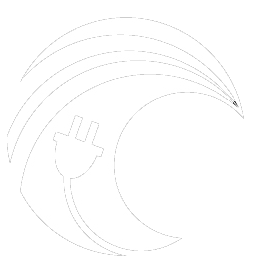What is marine energy?
For general purposes the term marine energy, also called marine renewable energy (MRE) or marine hydrokinetic energy (MHK), most commonly applies to energy generated from waves, tides, and currents. These forms of energy generation could be used in oceans, rivers, tidal areas, and a number of other marine settings. Marine energy can also include energy generated from ocean temperature gradients (ocean thermal energy conversion, or OTEC) and salinity gradients.
While offshore wind is not technically a form of marine energy, many PMEC members are active in offshore wind research and development due to overlapping concerns in topics like power integration and ocean engineering.
Traditional hydropower, energy generated in dams, is not considered to be marine energy.
More introductory information about marine energy can be found on web pages from PMEC collaborators such as the DOE's Water Power Technologies Office, PNNL's Tethys Knowledge Base, and David Hume's Liquid Grid website.
How can industry collaborate with PMEC?
There are multiple ways to collaborate. On one end of the spectrum are transactional contracts at affiliated testing facilities with varying levels of support by staff, students, and faculty. On the other are sustained research & development partnerships that collaboratively address challenges faced by industry. The latter often lead to joint publications and graduate student theses that disseminate results to the broader community, while protecting the Intellectual Property of industry partners.
PMEC also has an Industry Partner Network (IPN) whose members are invited to participate in its annual All-Center Meeting and receive periodic updates about PMEC activities. There is no charge to join the IPN. Questions on the IPN can be directed to IPN@pmec.us.
Does PMEC have the resources to independently support early stage research and testing requested by industry?
In general, no. Within the partner universities, most activity is aligned with specific funding objectives of federal, state, or private sponsors and cannot be unilaterally re-directed. PMEC is in the process of identifying mechanisms to better support early-stage collaborations with industry, particularly through the DOE's upcoming Testing Expertise and Access for Marine Energy Research (TEAMER) program.
What does it mean for faculty, staff, or student researchers to affiliate with PMEC?
Affiliation indicates coordinated research, development, and/or education activities in marine energy, along with a good faith commitment to engage with organizational initiatives (such as the All-Center Meeting). Faculty and staff who are Principle Investigators communicate funded research to the leadership team, such that this information can be used build support for new initiatives. In exchange, PIs can use their PMEC affiliation in research proposals to demonstrate their institutional strength in marine energy.
Can a student receive a degree from PMEC?
No, PMEC is not a degree-granting organization. Graduate and undergraduate students involved in PMEC activities are pursuing degrees from departments/schools within their respective universities. Prospective students can learn more about how to get involved with PMEC on the Study with PMEC page.
Who funds PMEC's activities?
PMEC was established by a single grant from the U.S. Department of Energy’s Wind and Water Power Office (DOE WPTO). This unified and expanded activity at Oregon State University and catalyzed activity at the University of Washington. Consortium-level funding from DOE played a similarly important role in bringing the University of Alaska Fairbanks into the Center in 2014.
Since inception, activity across institutions has diversified and now includes individual programs funded by the DOE WPTO, as well as investments by other federal agencies, states, industry, and foundations. This diversity has varied over time at partner institutions. A list of major sponsors can be found on the Collaborate with PMEC page.
How can I support PMEC?
Though PMEC has no central mechanism for direct support, we are always looking for new opportunities to advance marine energy and open to new partnerships. The diverse set of organizations affiliated with PMEC provides a number of mechanisms for collaboration and we encourage potential partners to reach out directly to the PMEC researchers of interest, or email us at one of the following:
- Research Inquiries: research@pmec.us
- Testing Inquiries: testing@pmec.us
- Outreach Inquiries: outreach@pmec.us
- General Inquiries: general@pmec.us
Who leads PMEC?
The PMEC leadership team consists of a lead Director that can rotate between institutions and co-Directors at each partner institution. Associate Directors support the lead Director and co-Directors as needed.
Current leadership team:
- Director: Bryson Robertson (OSU)
- Co-Directors: Shana Hirsch (UW), Benjamin Loeffler (UAF)
- Associate Directors: Christopher Bassett (UW), Michelle DiBenedetto (UW), Sarah Henkel (OSU), Ted Brekken (OSU)
What does the leadership team do?
The leadership team coordinates activities across the institutions in a manner that provides the greatest benefit for industry, students, and government agencies.
Who advises the leadership team?
An Advisory Board consisting of representatives from governmental and non-governmental organizations, the Industry Partner Network, and the DOE National Laboratories active in marine energy (NREL, PNNL, and Sandia), advises the leadership team. At present, the Advisory Board convenes in a face-to-face meeting with the leadership team following the annual All-Center Meeting.
